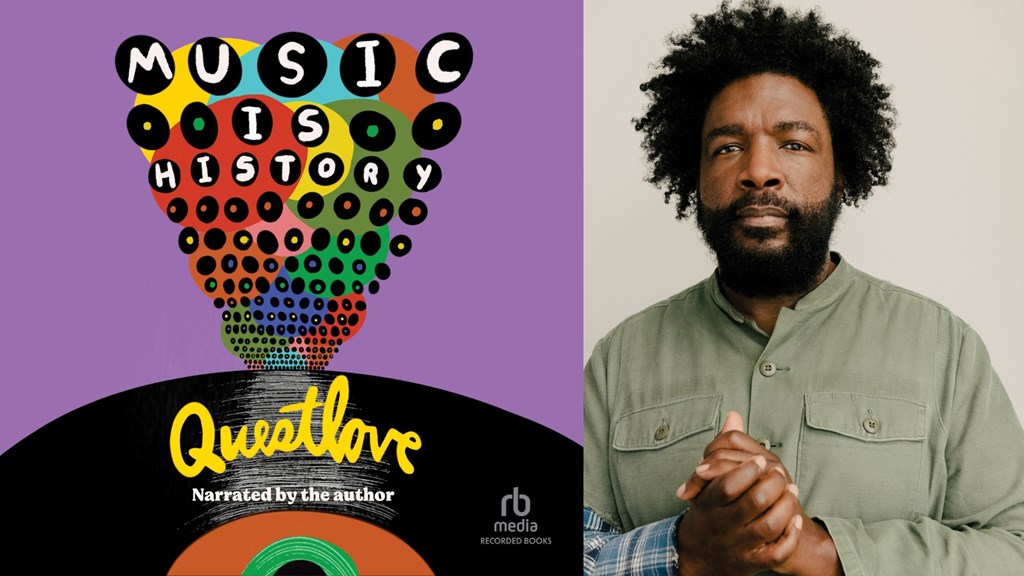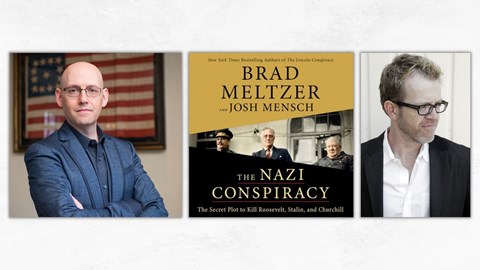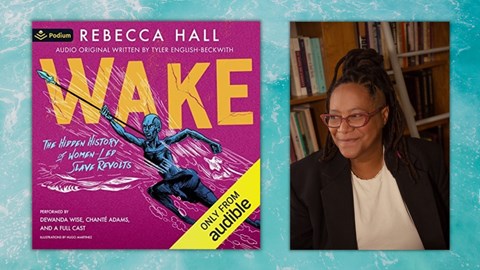AudioFile spoke with award-winning author, musician, and documentarian Questlove and producer Scott Sherratt about creating the audiobook of MUSIC IS HISTORY, which is nominated for a 2023 Grammy Award.
AudioFile: Scott, what are some of your favorite stories from working with Questlove to record MUSIC IS HISTORY?
Scott Sherratt: Setting the scene: March 2020 during the coronavirus lockdown, Questlove (Ahmir Khalib Thompson) started live-streaming marathon DJ sets, which provided such a welcome sense of connection for all of us self-isolated folks out there. As soon as I logged on to the first set, he saw my handle/profile and said, “Scott! I wrote another book, it’s 500 pages, get ready!”
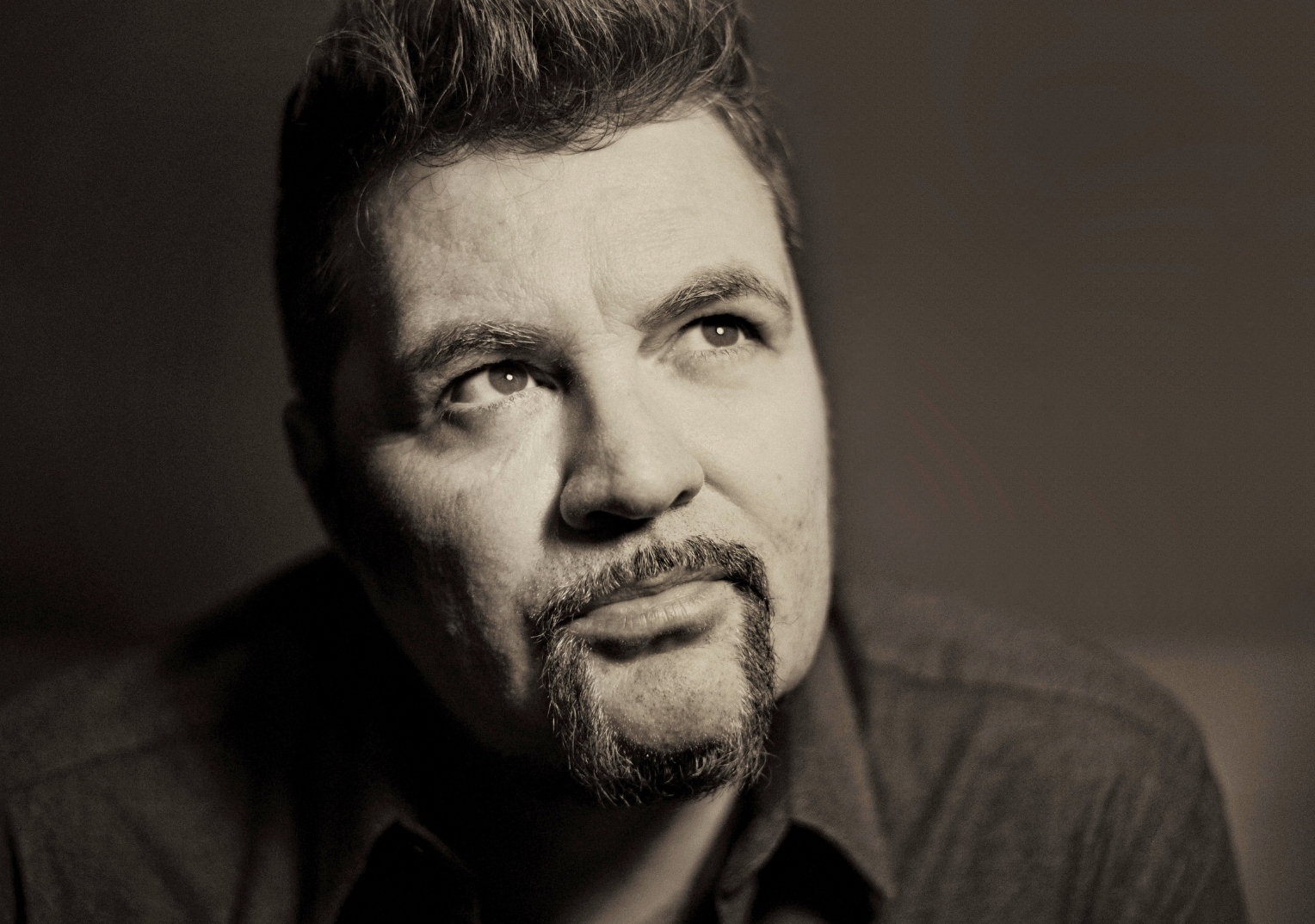
Cut to: Summer 2021, New York City, the pandemic continues, and MUSIC IS HISTORY (now a lean and tight 352 pages) is ready to record. Questlove’s manager/miracle worker, Alexis Rosenzweig, gave us the green light to get started. I was fortunate to be able to work remotely throughout the quarantine, but for me there really is no substitute for being in the room, especially if that room happens to be in the legendary studio that Jimi Hendrix built—ground zero for much of the greatest music of the last 50 years.
We returned to Electric Lady Studios, Ahmir’s home away from home, and got to work. We had recorded CREATIVE QUEST there a few years earlier, and, while I would have been happy to be anywhere after such a long stint of remote work, it was downright exciting to be back in action at Electric Lady. It is a magical place, and as Bono said, “I felt like I should take my shoes off to enter.”
Questlove managed to come out of the pandemic even busier than he was before, making our schedule a little acrobatic, and skewed toward late nights. The film he directed, Summer of Soul, a front-runner in early Oscar buzz (he went on to win), was quickly becoming one of the biggest events of the year. Questlove is also the bandleader at “The Tonight Show,” starring Jimmy Fallon. Add to those busy schedules a robust DJ calendar, his culinary ventures, and many other time-consuming entrepreneurial pursuits, and it is a miracle that we were able to carve out enough of his time to tackle something as ambitious as our MUSIC IS HISTORY recording.
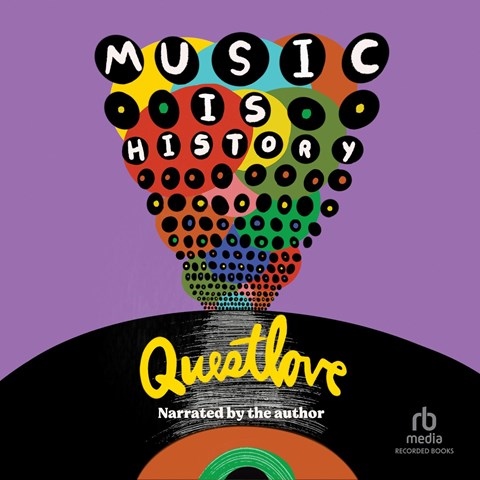 We had new safety considerations and Covid protocols to follow as well, which meant a pared down crew: me, Questlove, and his longtime engineer, Steve Mandel. I engineered and directed our voice sessions, and Steve recorded and mixed a treasure trove of fabulous music cues with Questlove and his band, The Roots. We put it all together with my mastering engineer, Danny Meltzer. The Recorded Books team were very kind and gave us room to shape it up and time to make it happen.
We had new safety considerations and Covid protocols to follow as well, which meant a pared down crew: me, Questlove, and his longtime engineer, Steve Mandel. I engineered and directed our voice sessions, and Steve recorded and mixed a treasure trove of fabulous music cues with Questlove and his band, The Roots. We put it all together with my mastering engineer, Danny Meltzer. The Recorded Books team were very kind and gave us room to shape it up and time to make it happen.
Electric Lady is a bit like an A-list community center. Jimmy Fallon popped in to record a few lines. Patti Smith, Mark Ronson, and other Electric Lady alumni were also at the studio, getting back in the swing of the things. One of the funniest moments for me was when Questlove texted Dave Grohl, who I hadn’t met yet, to share some audiobook anecdotes, as Dave’s audiobook was shaping up for me a little later in the year. It was a funny conversation. They genuinely are the two nicest guys in the music biz.
AF: How did you approach the narration?
Questlove: When I write a book, it begins in my head, and I have to think how it’s going to sound on the page. Except that “sound on the page” is kind of a contradiction in terms—it’s how it will sound in a reader’s head. When I get to the audiobook, it’s my chance to actually try to create a version of the text that sounds how it sounds in my head as I’m writing. Since this is a book of essays and personal reflections instead of a murder mystery or a motivational book, I approach the narration somewhere between teaching a class and having a conversation with a friend who is very interested in music, history, and pop culture but may not be as obsessive about it as I am.
SS: Questlove is a natural storyteller. Music is conversation, and conversation is music.
I believe that keeping it all in the family, with people he trusts, and being in the studio where he is most comfortable help foster an environment where he can relax and tell us all about it. We have a good rapport, and he still puts up with all my nattering, so we seem to have a formula that works. It’s a little work mixed with a lot of laughs.
AF: Tell us about the inclusion of music, sound effects, and quotes in the audiobook.
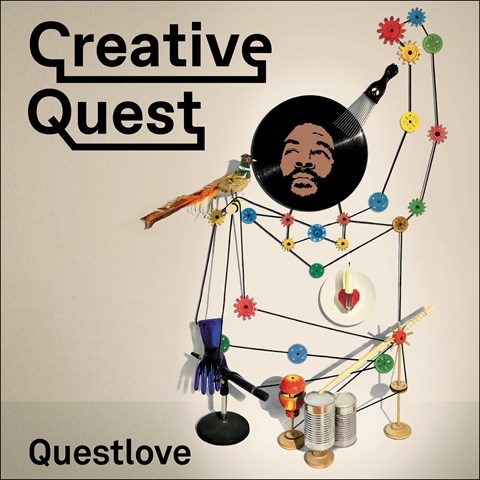 Questlove: On the last book I wrote, CREATIVE QUEST, I moved into the audiobook space with a real head of steam, convinced that I could do all of those things and turn the book into theater of the mind: Use different voices, sound effects, play around with the format. (I had done something similar with the memoir format on MO’ META BLUES—tried to write a memoir that turned the idea of a memoir inside out.) That book was a great canvas to learn to paint, and when it came time to write this book, I wrote it with a clearer sense of what would happen when it turned into an audiobook.
Questlove: On the last book I wrote, CREATIVE QUEST, I moved into the audiobook space with a real head of steam, convinced that I could do all of those things and turn the book into theater of the mind: Use different voices, sound effects, play around with the format. (I had done something similar with the memoir format on MO’ META BLUES—tried to write a memoir that turned the idea of a memoir inside out.) That book was a great canvas to learn to paint, and when it came time to write this book, I wrote it with a clearer sense of what would happen when it turned into an audiobook.
SS: Our first project, the Grammy-nominated CREATIVE QUEST, was a truly innovative adventure, which gave us a good sense of work flow for MUSIC IS HISTORY. The things we learned about working together then informed our approach with this one. Questlove has an encyclopedic knowledge of all things music, and MUSIC IS HISTORY covers the last half century of popular music as seen through his eyes and heard through his ears. He seems to hear a host of possibilities as he is writing, and we map things out while recording. It’s not so much that there’s a print version to adapt for audio—they evolve together, and Questlove has seemingly endless ideas about how it might all come together before we even start.
AF: Is there anything else you’d like to share with us about recording MUSIC IS HISTORY?
Questlove: In some ways, I feel like media has come full circle. When I was a kid, people would do radio shows that were, in a way, like audiobooks: full-service programs with narration, bed music, breaks, original compositions. That sort of went away as radio got more corporate, but in recent years podcasts have brought that back. There are podcasts that are original scripted series. There are podcasts that are personal stories with effects. Audio is a rich medium and getting richer. For someone who spends so much time listening to things, it’s great to try to stretch and reshape what an audiobook can do.
Questlove photo by Daniel Dorsa, Scott Sherratt photo by Jack Grisham


